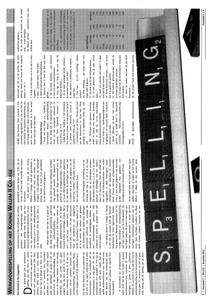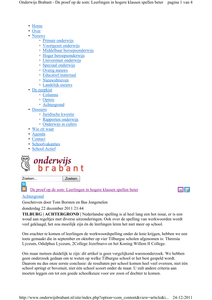Although poor reading and spelling skills have been associated with weak skills of executive functioning (EF), its role in literacy is not undisputed. Because EF has different theoretical underpinnings, methods of analysis and of assessing EF, it has led to varying and often contrasting results in its effects in children with dyslexia. The present study has two goals. The first goal is to establish the relationship between a large number of EF tasks and reading and spelling skills in a large number of Dutch dyslexic children (n = 229). More interesting, however, is the second aim. To what extent do EF skills predict progress in reading and spelling in dyslexic children who attend a remediation program? The results reveal small, but significant relationships between EF and reading and spelling skills, but no relationships between EF and progress in reading and spelling. It is concluded that training EF skills is unlikely to enhance reading and spelling skills.
MULTIFILE
Nederlandse spelling is al heel lang een hot issue, er is een woud aan regeltjes met diverse uitzonderingen. Ook over de spelling van werkwoorden wordt veel geklaagd, het zou moeilijk zijn én de leerlingen leren het niet meer op school. Om erachter te komen of leerlingen de werkwoordspelling onder de knie krijgen, hebben we een toets gemaakt die in september en oktober op het Koning Willem II College afgenomen is.
DOCUMENT

Nederlandse spelling is al heel lang een hot issue, er is een woud aan regeltjes met diverse uitzonderingen. Ook over de spelling van werkwoorden wordt veel geklaagd, het zou moeilijk zijn én de leerlingen leren het niet meer op school. Om erachter te komen of leerlingen de werkwoordspelling onder de knie krijgen, hebben we een toets gemaakt die in september en oktober op vier Tilburgse scholen afgenomen is: Theresia Lyceum, Odulphus Lyceum, 2College Jozefmavo en het Koning Willem II College.
DOCUMENT

Orthography is considered to be a major problem in Dutch education, since many pupils don’t seem to be able to master orthographic rules, even after years of education. In educational literature it is argued that the problems related to spelling are caused by approaches that focus more on rules of thumb than on linguistic insights. This is somewhat remarkable, since a good understanding of the Dutch orthographic system requires a fair amount of morphological knowledge. In order to effectively implement this knowledge, the development of a morphological awareness (MA) seems to be required. Therefore, a short intervention was designed for the upper levels of secondary schools (4 havo) which aimed to foster MA and, subsequently, improve orthographic skills. Results of this quasi-experimental study indicate that a short intervention can significantly boost MA, but that students don’t seem to be able to use MA effectively to enhance spelling performance.
DOCUMENT

De werkwoordpsellingvaardigheid van leerlingen op het Theresia Lyceum in Tilburg gaat niet achteruit. Naarmate leerlingen langer op school zitten en een hogere vorm van onderwijs genieten gaan de resultaten erop vooruit.
DOCUMENT

A heterogeneous sample of 137 school-aged children with learning disabilities (IQ > 80) attending special needs schools was examined on the Movement Assessment Battery for Children (MABC). The results show that compared to the available norm scores, 52.6% of the children tested performed below the 15th percentile on manual dexterity, 40.9% on ball skills, and 33.7% on balance skills. Furthermore, after controlling for IQ, significant small to moderate partial correlations were found between spelling and mathematics and the MABC total score, as well as small to moderate correlations between mathematics and balance, between reading and ball skills, and between spelling and manual dexterity. The present findings are compared with previously reported results obtained in more homogenous groups, and based on the resultant relationships between academic performance and motor development, recommendations for future motor intervention studies are made.
DOCUMENT
Middelbare scholieren spellen beter dan bassisschoolleerlingen, dit is de uitkomst van onderzoek.
DOCUMENT

Leerlingen in 5 havo spellen net zo goed / slecht als eerstejaars studenten op het hbo.
DOCUMENT

De cito-score aan het eind van de brugklas en de vaardigheid op het gebied van werkwoorspelling hangen met elkaar samen. Hoe hoger de score, hoe beter de werkwoordspelling.
DOCUMENT
